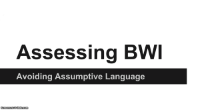Assessment
-
Assessing Biblical Worldview Integration
 Scott Hayden at the International Community School in Thailand has been instrumental in helping the school think about developing discerning thinkers.
Scott Hayden at the International Community School in Thailand has been instrumental in helping the school think about developing discerning thinkers.He has very helpful examples of the importance of avoiding assumptive language—a very real problem, especially when assessing students. An important part of the power of education to shape thinking is the assumptive language of the teacher, but it is easy to misuse the power to coerce responses rather than allow individual choice. In all environments, it is easy to misuse the power of teachers to get students to say what the teacher wants them to say. As Christians, we want students to know and love God through Jesus Christ and in the power of the Holy Spirit unselfishly love others. However, producing “marks Christians” doesn’t honor the God who graciously and humbly allows personal choice even though the majority of His creation reject His love.
Especially in a mixed environment where there is a very wide range of perspectives on Biblical truth, it is important to consider the words that we use. Many teachers find themselves in an environment hostile to the overt presentation of truth, but this video not only points them away from pitfalls, but towards new opportunities for truth to be considered. Christians should be interested in critical and discerning thinking because of our understanding of God’s image in all people. We, of all people, should promote the development of the God-given gifts of logic, understanding and communication. Asking the right kind of questions can open rather than close consideration of controversial ideas.
-
Evaluating the Biblical perspective of students
By Michael B. Essenburg
How well do your students understand and use a Biblical perspective of the subject(s) you teach?
-
Michael Essenburg Pinterest
“…a bank of online professional development resources (by subject area and by topic—assessment, instruction, biblical perspective…) for teachers at international Christian schools”
-
Using Questions
Use questions to help your students increase their understanding and use of a Biblical perspective
